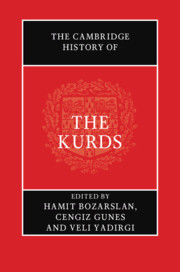Book contents
- The Cambridge History of the Kurds
- The Cambridge History of the Kurds
- Copyright page
- Contents
- Figures
- Maps
- Tables
- Contributors
- Acknowledgements
- Abbreviations
- Additional material
- Introduction
- Part I Historical Legacies
- 1 The Rise and Fall of the Kurdish Emirates (Fifteenth to Nineteenth Centuries)
- 2 Negotiating Political Power in the Early Modern Middle East
- 3 The End of Kurdish Autonomy
- 4 The Kurdish Movement and the End of the Ottoman Empire, 1880–1923
- 5 Religious Narrations of the Kurdish Nation during the Late Nineteenth and Early Twentieth Centuries
- 6 The Political Economy of Kurdistan
- Part II Regional Political Developments and the Kurds in the Twentieth and Twenty-First Centuries
- Part III Domestic Political Developments and the Kurds in the Twentieth and Twenty-First Centuries
- Part IV Religion and Society
- Part V Kurdish Language
- Part VI Art, Culture and Literature
- Part VII Transversal Dynamics
- Index
- References
5 - Religious Narrations of the Kurdish Nation during the Late Nineteenth and Early Twentieth Centuries
from Part I - Historical Legacies
Published online by Cambridge University Press: 13 April 2021
- The Cambridge History of the Kurds
- The Cambridge History of the Kurds
- Copyright page
- Contents
- Figures
- Maps
- Tables
- Contributors
- Acknowledgements
- Abbreviations
- Additional material
- Introduction
- Part I Historical Legacies
- 1 The Rise and Fall of the Kurdish Emirates (Fifteenth to Nineteenth Centuries)
- 2 Negotiating Political Power in the Early Modern Middle East
- 3 The End of Kurdish Autonomy
- 4 The Kurdish Movement and the End of the Ottoman Empire, 1880–1923
- 5 Religious Narrations of the Kurdish Nation during the Late Nineteenth and Early Twentieth Centuries
- 6 The Political Economy of Kurdistan
- Part II Regional Political Developments and the Kurds in the Twentieth and Twenty-First Centuries
- Part III Domestic Political Developments and the Kurds in the Twentieth and Twenty-First Centuries
- Part IV Religion and Society
- Part V Kurdish Language
- Part VI Art, Culture and Literature
- Part VII Transversal Dynamics
- Index
- References
Summary
This chapter sheds some light on the fusion of Islam and nationalism in modern Kurdish history. It selectively discusses the views and activities of some influential late nineteenth- and early twentieth-century Kurdish religio-political figures. It is an attempt to demonstrate that Kurdish religiosity, like that of other Muslim communities, accommodated their nationalism. Major Kurdish religious figures were open to, supported and often worked for some forms of Kurdish self-rule: they imagined Kurds as a distinct nation and therefore defended and declared the legitimacy of Kurdish political demands and rights. The latter point defines nationalism since the right to self-rule is principally based on self-referentiality. Hence, this chapter argues that the defining point of religious nationalism is that the modern religious agent creates/imagines the boundaries of her collective self within those of the national.
- Type
- Chapter
- Information
- The Cambridge History of the Kurds , pp. 138 - 165Publisher: Cambridge University PressPrint publication year: 2021
References
Primary Sources
Secondary Sources
- 2
- Cited by



